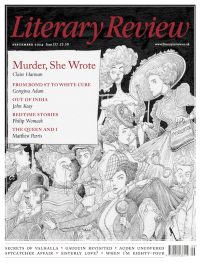Richard Vinen
Tories on the Home Front
Blue Jerusalem: British Conservatism, Winston Churchill, and the Second World War
By Kit Kowol
Oxford University Press 352pp £30
Publishers believe that Churchill sells books. This presumably accounts for the subtitle of Kit Kowol’s excellent monograph on Conservative politics during the Second World War, which, in fact, says little about the man who was prime minister from May 1940 until July 1945. Readers, however, will have no reason to think that they have been short-changed. In many ways, the absence of Churchill is one of the book’s strengths. It feels as if one is being shown around a familiar building from which the furniture has been removed: one sees features of the architecture that were previously obscured.
Kowol’s central argument about wartime conservatism is simply that such a thing existed. Most historians of Britain in the Second World War can be divided into two groups. One examines the conduct of the war, which means a heavy emphasis on Churchill and his entourage rather than domestic politics. The other focuses on the home front. This groups gives more weight to civilians than soldiers and presents Labour ministers as controlling domestic policy and laying the foundations of the welfare state, behind the backs of the Tories.
But Kowol points out that the Conservatives had won the great majority of seats in the 1935 general election, the last to be held before the war, and were, therefore, dominant in the wartime government. He does not see the creation of the coalition in May 1940 as the end

Sign Up to our newsletter
Receive free articles, highlights from the archive, news, details of prizes, and much more.@Lit_Review
Follow Literary Review on Twitter
Twitter Feed
Does the monumental life of WH Auden justify yet another book?
@FionaRSampson considers the latest effort.
Fiona Sampson - Tell Me the Truth About Love
Fiona Sampson: Tell Me the Truth About Love - The Island: W H Auden and the Last of Englishness by Nicholas Jenkins
literaryreview.co.uk
Here's Michael Billington's (@billicritic) superb piece for the next @Lit_Review about Anand Tucker's film about 1930s theatre, theatre-going, and theatre reviewing, The Critic, written by Patrick Marber, starring Ian McKellen and Gemma Arterton
The theatre has always fascinated filmmakers. Is this latest addition to the long list of theatrical flicks, The Critic, written by Patrick Marber and directed by Anand Tucker, a hit or a flop?
@billicritic gives his verdict.
https://literaryreview.co.uk/ring-down-the-curtain